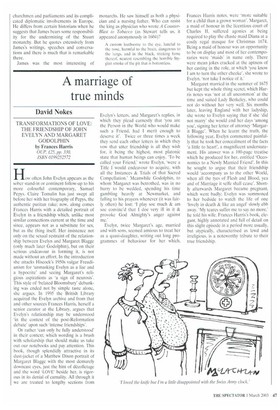A marriage of true minds
David Nokes
TRANSFORMATIONS OF LOVE: THE FRIENDSHIP OF JOHN EVELYN AND MARGARET GODOLPHIN by Frances Harris OUP, £25, pp. 330. ISBN 0199252572 How often John Evelyn appears as the sober stand-in or continent follow-up to his more colourful contemporary, Samuel Pepy-s, Claire Tomalin has just swept all before her with her biography of Pepys, the authentic puritan rake; now, along comes Frances Harris with a detailed portrait of Evelyn in a friendship which, unlike most similar connections current at the time and since, appears not as a substitute for sex, but as the thing itself. Her insistence not only on the sexual restraint of the relationship between Evelyn and Margaret Blagge (only much later Godolphin), but on their serious endeavour in forming it, is not made without an effort. In the introduction she attacks Hiscock's 1950s vulgar Freudianism for 'unmasking Evelyn as a liar and a hypocrite' and seeing Margaret's religious aspirations as 'a sign of neurosis'. This style of 'belated Bloomsbury' debunking was ended not by simple taste alone, she argues. In 1995 the British Library acquired the Evelyn archive and from that and other sources Frances Harris, herself a senior curator at the Library, argues that Evelyn's relationship may be understood 'in the context of the post-Reformation debate' upon such 'intense friendships'.
Or rather 'can only be fully understood' in their context; which wording is a brush with scholarship that should make us take out our notebooks and pay attention. This book, though splendidly attractive in its dust-jacket of a Matthew Dixon portrait of Margaret Blagge with the most demurely downcast eyes, just the hint of décolletage and the word 'LOVE' beside her, is rigorous in its denial of carnality. All through it we are treated to lengthy sections from Evelyn's letters, and Margaret's replies, in which they plead earnestly that 'you are the Person in the World who would make such a Friend, had I merit enough to deserve it'. Twice or three times a week they send each other letters in which they vow that utter friendship is all they wish for, it being the highest, most platonic state that human beings can enjoy. 'To be called your Friend,' wrote Evelyn, were a Title I would endeavour to acquire, with all the Instances & Trials of that Sacred Compellation.' Meanwhile Godolphin, to whom Margaret was betrothed, was in no hurry to be wedded, spending his time gambling heavily at Newmarket, and falling to his prayers whenever (it was fairly often) he lost: 'I play sue much & am soe convinc'd that I doe very ill in it & provoke God Almighty's anger against me.'
Evelyn, twice Margaret's age, married and with sons, seemed anxious to treat her as a quasi-daughter, writing out long programmes of behaviour for her which, Frances Harris notes, were 'more Suitable for a child than a grown woman'. Margaret, a maid of honour in the licentious court of Charles II, suffered agonies at being required to play the chaste maid Diana at a costly regal masque for Christmas 1674. Being a maid of honour was an opportunity to be on display and most of her contemporaries were 'maids' in name only. There were mean jokes cracked at the aptness of her casting in the role, at which 'you know I am to turn the other cheeke., she wrote to Evelyn, 'nor take I notice of it.'
Margaret married in the summer of 1675 but kept the whole thing secret, which Harris notes was 'not at all uncommon' at the time and suited Lady Berkeley, who could not do without her very well. Six months later, leaving England with her ladyship, she wrote to Evelyn saying that if she 'did not marry she would end her days 'among you', signing her letter of attorney `Margarit Blagge'. When he learnt the truth, the following year, Evelyn commented painfully that he took her concealment of the facts 'a little to heart', a magnificent understatement. His answer was a 100-page treatise which he produced for her, entitled 'Oeconomics to a Newly Married Friend'. In this he sought to argue that their friendship would 'accompany us to the other World, when all the tyes of Flesh and Blood, yea and of Marriage it selfe shall cease'. Shortly afterwards Margaret became pregnant, which went badly: Evelyn was summoned to her bedside to watch the life of one 'lovely in death & like an angel' slowly ebb away. 'My teares suffer me to say no more,' he told his wife. Frances Harris's book, elegant, highly annotated and full of detail on this slight episode in a period more usually, but atypically, characterised as lewd and irreligious, is a noteworthy tribute to their true friendship.


















































































 Previous page
Previous page